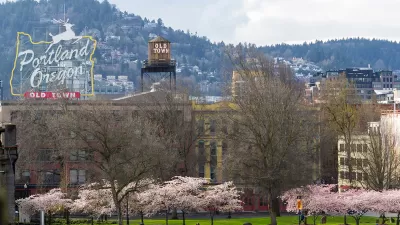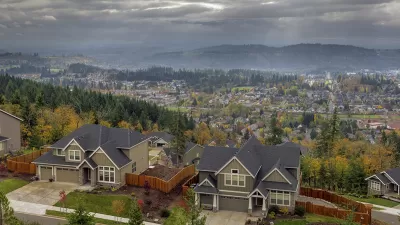The city of Portland, Oregon is considering new regulations to limit the kinds of homes that can be built in existing neighborhoods.
Portland for Everyone writes a post explaining the city's residential infill project, expected to appear before the City Council for consideration at the beginning of November.
The basic idea behind the new residential refill regulations is to reduce the number of 1:1 demolitions in much of the city, which usually turns an older, affordable home into an expensive McMansion. The residential infill project recommends the following changes, all explained in clear detail in the post:
- Greatly reducing the maximum size of new homes.
- Re-legalizing midblock duplexes, corner triplexes, and multiple accessory units.
- New rules about building height and distance from the street.
- Create more tree-lined streets.
- Preserve more on-street parking space.
The post also notes the limitations in how much the ordinance can accomplish, including how many demolitions are likely to be prevented and how affordable new units will be under the new regulations.
FULL STORY: The ‘residential infill project’: Portland’s anti-McMansion recipe

Planetizen Federal Action Tracker
A weekly monitor of how Trump’s orders and actions are impacting planners and planning in America.

San Francisco's School District Spent $105M To Build Affordable Housing for Teachers — And That's Just the Beginning
SFUSD joins a growing list of school districts using their land holdings to address housing affordability challenges faced by their own employees.

The Tiny, Adorable $7,000 Car Turning Japan Onto EVs
The single seat Mibot charges from a regular plug as quickly as an iPad, and is about half the price of an average EV.

Seattle's Plan for Adopting Driverless Cars
Equity, safety, accessibility and affordability are front of mind as the city prepares for robotaxis and other autonomous vehicles.

As Trump Phases Out FEMA, Is It Time to Flee the Floodplains?
With less federal funding available for disaster relief efforts, the need to relocate at-risk communities is more urgent than ever.

With Protected Lanes, 460% More People Commute by Bike
For those needing more ammo, more data proving what we already knew is here.
Urban Design for Planners 1: Software Tools
This six-course series explores essential urban design concepts using open source software and equips planners with the tools they need to participate fully in the urban design process.
Planning for Universal Design
Learn the tools for implementing Universal Design in planning regulations.
Smith Gee Studio
City of Charlotte
City of Camden Redevelopment Agency
City of Astoria
Transportation Research & Education Center (TREC) at Portland State University
US High Speed Rail Association
City of Camden Redevelopment Agency
Municipality of Princeton (NJ)





























